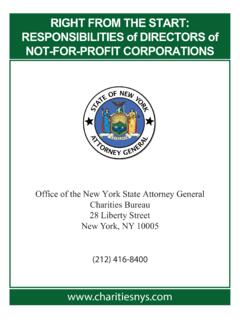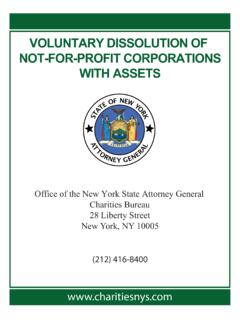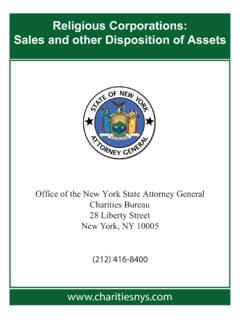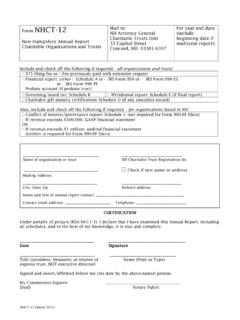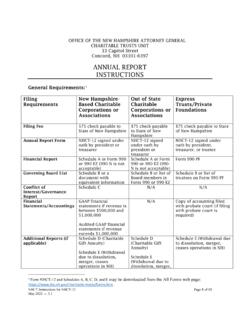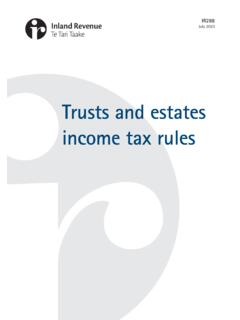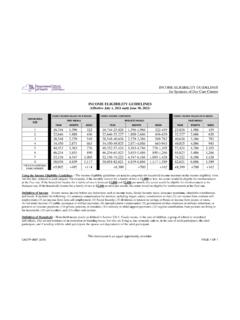Transcription of Charities Bureau Guidance Document Issue date: September ...
1 Charities Bureau Guidance Document Issue date: September 2018 AUDIT COMMITTEE REQUIREMENTS AND RESPONSIBILITIES UNDER NEW YORK S NOT-FOR-PROFIT CORPORATION LAW AS AMENDED THROUGH 2017 New York s Executive Law requires most organizations that solicit charitable contributions in New York to register with the Attorney General s Charities Bureau pursuant to Article 7-A of the Executive Organizations that are required to register with the Charities Bureau and whose revenues exceed the thresholds described later in this Guidance are required to submit audited financial statements in conformity with generally accepted accounting principles, including compliance with all pronouncements of the financial accounting standards board and the American Institute of Certified Public Accountants.
2 2 The audit must be submitted to the Charities Bureau with New York s Annual Filing for charitable Organizations (Form CHAR500) and Internal Revenue Service Form 990. To enhance compliance with the audit requirement, the Nonprofit Revitalization Act of 2013 ( NPRA ) added section 712-a to the Not-for-Profit Corporation Law ( N-PCL ) setting forth the audit oversight responsibilities of not-for-profit corporations and section to the Estates, Powers and Trusts Law ( EPTL ) setting forth the responsibilities of trusts3 that are subject to the audit requirements. EPTL section 8- specifically makes applicable to charitable trusts a number of sections of the NPRA, including the provisions addressing audit oversight, as well as related party transactions and mandatory conflict of interest and whistleblower policies.
3 This Guidance reflects amendments to the NPRA that were adopted in November of 2016 and, with one exception, became effective on May 27, 1 Section 172-a of the Executive Law exempts from registration certain categories of organizations, including religious organizations. That statute, which is posted at , should be consulted to determine if a particular organization may be entitled to an exemption. 2 Section 172-b of the Executive Law. 3 Throughout this Guidance , the term nonprofit may be used to refer collectively to not-for-profit corporations and charitable trusts. 4 An amendment to Not-for-Profit Corporation Law 713(f) that permits an employee to be the board chair under certain circumstances became effective on January 1, 2017.
4 2 New York s legislature enacted NPRA s audit provisions to require a nonprofit s review of its auditor s report to be independent of management and to be conducted by individuals who have no financial interest in the nonprofit and whose families have no such interests. NPRA also requires certain internal controls to be implemented to strengthen the oversight of nonprofits assets. Likewise, by mandating the formation of Audit Committees by nonprofits and requiring the independence of nonprofits auditors, NPRA was enacted to assure nonprofits are accountable for the use and protection of charitable assets, and to provide direction on use of the services of an independent auditor and the work of a committee of independent directors formed for those purposes.
5 The independent professional auditor is the only professional who, pursuant to the N-PCL, not-for-profit corporations are required to engage. The independent auditor has a dual responsibility - the public responsibility to provide reasonable assurance that financial statements detailing the sources and uses of charitable funds are complete and accurate, and a responsibility to those charged with governance to provide the benefit of information obtained during their audit work. Review by competent and responsible auditors - based on their expertise, systems, and experience with other organizations - can provide a significant benefit to those charged with governance by identifying best practices and opportunities for organizational improvement.
6 This Guidance has been prepared to assist nonprofits in implementing audit oversight procedures or revising procedures already in place, and to help them make effective use of the independent audit process. It should not, however, be viewed as a substitute for advice from an organization s attorney, accountant, or the opinion of the independent auditor. Establishing or Modifying the Audit Committee Effective with the adoption of the NPRA, on July 1, 2014, a corporation or trust required by Article 7- A of the Executive Law to file an independent certified public accountant s audit, must have either a designated Audit Committee consisting entirely of independent directors or the Board of Directors (with only independent members participating in the deliberations or voting) oversee the audit of the corporation s financial statements.
7 N-PCL section 712-a (b) requires additional oversight responsibilities of nonprofits that have annual revenue of over one million dollars. The Charities Bureau recognizes that Audit Committees and Boards may require assistance from individuals with expertise in accounting and financial matters who are not members of the Board or Audit Committee. However, participation in the Audit Committee s formal deliberations and voting must be limited to the independent director members. Nothing in the law or this Guidance precludes the Board or the Audit Committee from seeking advice from such non-members, or from providing some honorific designation to persons who provide such services. However, members of current management, who are responsible for developing and maintaining financial controls, should not also be involved in the Audit Committee s performance of its duties as set forth in N-PCL Section 712-a (b).
8 Only independent directors may participate in any board or committee deliberations or voting relating to the matters set forth in Section 712-a (b). However, nothing in the NPRA or any Guidance shall prevent members of the Board who are not independent directors from receiving or hearing the report of the Audit Committee s activities to the Board as set forth in N-PCL Section 712-a(b)(4). 3 Hiring an Independent Certified Public Accountant The board (or audit committee) of a nonprofit required to file an audit with its form CHAR500 must engage an independent Certified Public Accountant ( CPA ) to perform the annual financial statement audit. An independent CPA (also commonly referred to as an auditor ) is an individual or company that does not have a financial or familial relationship with the nonprofit.
9 For example, the CPA cannot be a member of the organization s board, a paid employee, a relative of an employee or have other professional or financial transactions with the organization. The American Institute of CPAs ( AICPA ) Code of Professional Conduct as revised, effective December 15, 2014 guides the CPA in meeting independence requirements. ( ) According to the AICPA Code of Professional Conduct, independence consists of two elements, defined as follows: (a) Independence of mind is the state of mind that permits a member to perform an attest service without being affected by influences that compromise professional judgment, thereby allowing an individual to act with integrity and exercise objectivity and professional skepticism, and (b) Independence in appearance is the avoidance of circumstances that would cause a reasonable and informed third party who has knowledge of all relevant information, including the safeguards applied, to conclude reasonably that the integrity, objectivity, or professional skepticism of a firm or member of the attest engagement team is compromised.
10 For example, an auditor cannot independently evaluate its own firm's work, including, for example, maintaining the client s general ledger, even if performed by another unit or group in the auditing organization. Among other considerations, the audit committee or board should consider when hiring or re-appointing an auditor, i s the reputation of the CPA (both the firm and the individuals assigned to the engagement), references provided, expertise or familiarity with nonprofit accounting and the fee structure for the engagement. Staff continuity of the audit team, the expected timeline and delivery of services, and other benefits of engaging a particular firm should also be considered. Before engaging an auditor, the Audit Committee should also inquire whether the audit firm or predecessor firms have been sanctioned or been the subject of a government investigation, prosecution, or settlement in connection with its audit work, and, if so, the circumstances and outcome of such investigation, prosecution, or settlement.


